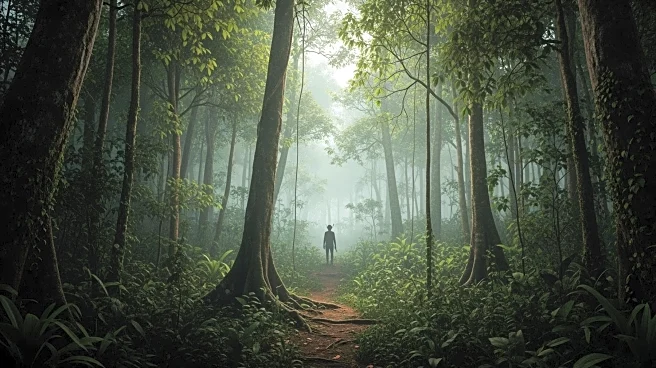What's Happening?
Survival International, an Indigenous rights organization based in London, has released a report highlighting the precarious situation faced by uncontacted Indigenous tribes across the globe. The report identifies
196 uncontacted groups, primarily located in South American countries sharing the Amazon rainforest. These tribes are under threat from logging, mining, and agribusiness, with nearly 65% facing logging threats, 40% from mining, and 20% from agribusiness. The report warns that half of these groups could face extinction within the next decade if governments and companies do not take action. The uncontacted tribes, often romanticized as 'lost tribes,' are contemporary societies that have chosen isolation due to historical violence and disease. They play a crucial role in preserving the forests, which are vital in combating climate change.
Why It's Important?
The potential extinction of uncontacted Indigenous tribes poses significant ethical and environmental challenges. These tribes are integral to the preservation of biodiversity and the stabilization of global climate systems. Their territories are often rich in natural resources, making them targets for extractive industries. The loss of these communities would not only be a humanitarian crisis but also a setback in global efforts to combat climate change. The report calls for stronger legal protections and a shift in public perception, recognizing these tribes as vital contributors to global ecological health rather than obstacles to development. The situation underscores the need for international cooperation and policy enforcement to safeguard Indigenous rights and territories.
What's Next?
The report advocates for a global no-contact policy, urging legal recognition of uncontacted territories and the suspension of extractive projects near these lands. Governments are called upon to enforce Indigenous territories as off-limits to industries and to prosecute crimes against Indigenous groups. The report emphasizes the importance of mapping these territories with caution to avoid endangering the tribes. Public opinion and pressure are deemed essential in driving change, with calls for companies to trace their supply chains to ensure commodities are not sourced from Indigenous lands. The report highlights the need for international treaties to be enforced consistently to protect these vulnerable communities.
Beyond the Headlines
The threats faced by uncontacted tribes are not only environmental but also cultural and ethical. The encroachment of industries and illegal activities into their territories risks eroding their traditional ways of life and belief systems. The report highlights the role of organized crime and missionary activities in exacerbating these threats. The tribes' isolation is a deliberate choice to preserve their autonomy and way of life, and any contact could lead to devastating consequences, including disease outbreaks. The situation calls for a reevaluation of how modern society interacts with these communities, emphasizing respect for their autonomy and contributions to global ecological health.








